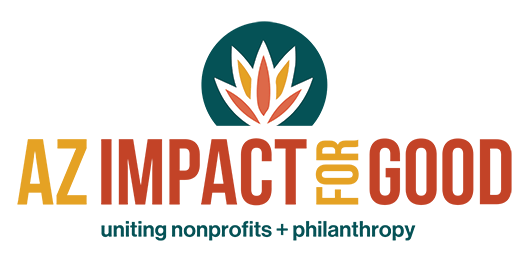Cultivating the Generosity of Seasonal Residents
by Richard Tollefson | The Phoenix Philanthropy Group
Click here for link to original article in InBusiness Magazine Greater Phoenix
Mobile philanthropists do invest in second-home communities
As people become more mobile, so does their attitude toward giving. The notion that seasonal residents with homes in multiple communities are an unlikely source of philanthropic support is just false. Plain and simple.
The Power of Personal Connections
Howard Katz, a retired Goldman Sachs executive who lives in Manhattan, the Hamptons and Scottsdale, never intended to get involved as a part-time resident in Arizona. A personal introduction and invitation from an active board member involved with a hospital foundation and museum changed his mind. Katz and his wife, Ellen, became engaged in their Phoenix and Scottsdale communities, met people with common interests and became generous donors and active board members of many local organizations. “Organizations need to find a way to make contact with seasonal residents who may be interested – whether they know it or not – in what their organizations offer, and that most effectively comes through active donors or volunteer leaders whose social and philanthropic networks and interests align.”
Board of director members are uniquely positioned to create this connection. “Board members are your ambassadors, your reach into the community,” says Geri Wright, managing director at the Arizona Theatre Company. “If they are passionate members who make connections in the community, their passion can be contagious while building relationships with part-time and full-time residents.”
Katz and Wright agree. One-on-one introductions are imperative, especially with part-time residents. Making that initial introduction can open the door for part-time residents who may not yet have established groups of local friends or acquaintances. That bond can lead to years of generosity and leadership from part-time residents, even if they only live in the area for a few months each year.
Events Still Have an Appeal
Fundraising events are still relevant. Whether in-person, virtual or a hybrid, events serve as the entry point for new donors and provide opportunities to cultivate relationships, recognize important members of the organization and keep donors engaged and informed — wherever they are.
While in-person events return to popularity post-COVID, virtual events continue to offer benefits. Organizations can better engage part-time residents during their “off-season,” reach donors nationally and connect with wealthy millennials and others who may prefer a digital option.
Should Fundraising Efforts Differ for Part-Time Residents?
The answer is a resounding no. “Fundraising efforts should be ongoing, whether the donors are here or not,” says Jared Langkilde, president and CEO of HonorHealth Foundation. “And the relationship needs to be ongoing, too. People are people — they want to be appreciated, meaningfully and authentically engaged and considered more than just a checkbook.”
“Many mobile residents are equally passionate about helping communities blossom as their local counterparts and will donate year-round,” says Langkilde. One key to keeping them engaged is data. “Data is like liquid gold. For example, it’s important to have your donors’ alternate addresses in your mailing list. As people become more mobile, it’s vital to continue the conversation with them wherever they are.” Nonprofits should stay in touch and express gratitude throughout the year to keep these donors connected to the organization.
Nonprofits should also remember that what constitutes meaningful engagement depends on the donor. There’s a segment of mobile philanthropists who don’t want to become deeply involved with the nonprofit or play a leadership role. They just want to write a check and enjoy the “perks” associated with being a donor, according to Jeffrey Byrne, CEO of Byrne Pelofsky, resident of Kansas City and part-time resident and active philanthropist in Vail, Colorado. “These are donors who will prioritize giving based on where they are at the time, what they are interested in doing — socially, culturally, recreationally — and who they are interested in meeting. It’s wise for nonprofits to ensure these donors get the perks and benefits they are looking for,” advises Byrne, “so that these part-time residents are happy with their donor experience.”
Incentivizing Board Members
Nonprofits must acknowledge the role their board members play in fostering connections with mobile philanthropists. They should encourage board members, trustees and others by rewarding and recognizing their efforts.
Some board members may be incentivized to expand their outreach through recognition among their board peers or special benefits offered to them. Access to the CEO, VIP special events, behind-the-scenes access and other incentives allow board members to easily host and impress their part-time friends.
Nonprofits must explore every opportunity for new funding streams, including seasonal residents. Don’t be intimidated or reluctant. Get out there and make those personal connections to unlock the potential of mobile wealth.
Key Takeaways
As nonprofits seek to build and optimize relationships with mobile philanthropists, they should:
- Know their interests. Part-time seasonal residents will give generously to organizations that appeal to their interests, purpose and goals. First points of entry often include organizations that directly align with their wellness, cultural and recreational priorities.
- Create the link. Nonprofits should leverage board members’ community connections and social interactions to open doors to new sources of philanthropic support.
- Facilitate a sense of community. Establishing a social network and a sense of belonging in mobile donors’ new communities — and staying connected year-round — creates a comfortable and inviting environment for engaging prospective donors.
- Fundraise where they are. While in-person events and meetings are back in play, virtual and live-stream events remain important, allowing organizations to reach donors wherever they are.
Richard Tollefson is founder and president of The Phoenix Philanthropy Group, an international consulting firm serving nonprofit organizations as well as institutional and individual philanthropists.
